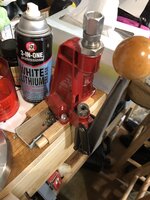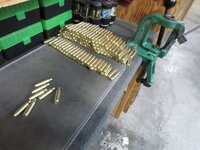- Messages
- 21,454
- Reactions
- 49,786
Thanks for the tip on the Lee crimp die. I was wondering about relying on the seating die for a crimp, or using a dedicated crimping die. I think I'll buy one to see how I like it.
Assuming you are talking handgun rounds here? Then yes, Lee Carbide and the Lee FC are fantastic. When I started rolling I had seen it done a couple times. Bought a Lee kit. Was told their stuff was crap, don't waste your money. Well they were wrong. At that time a set of Lee Carbide cost 50% of what name brand steel dies cost. When the FC came along I tried one and loved it. Now if you ever get into shooting something that is precision and you are trying to get MOA groups at hundreds of yards, then maybe something better. All depends of course on what you are looking for.








 .
.




